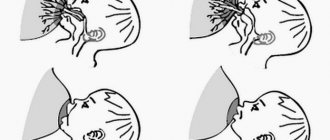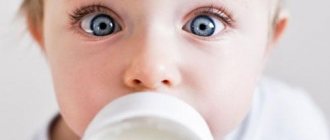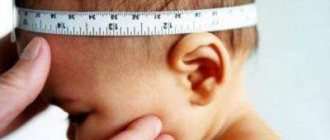Start
In articles about breastfeeding, we repeatedly say that each couple - mother and child - is unique, each problem requires individual consideration. However, there are almost always some general recommendations that in any case will not harm and, perhaps, will even help the mother figure out the situation on her own.
Alcohol and breastfeeding
Research by Serge Rend has confirmed that drinking grape-based ethanol drinks improves immunity, improves mood and generally has a good effect on organ function. But alcohol has the opposite effect. It penetrates into all organic fluids, lymph, and interferes with normal lactation. Therefore, when asked whether a nursing mother can drink, 99% of doctors will answer that it is not possible. If you have drunk a couple of glasses of any alcoholic drink, then wait until your organs process it.
False hypogalactia
We have already mentioned that sometimes so-called false hypogalactia occurs, i.e. a condition when the mother thinks that she has little milk, but in fact the baby may well have enough milk. When does this happen? When a mother, ignoring reliable signs, begins to focus only on the following indicators and situations.
The mother does “control feedings” - weighs the baby before and after feeding. She is nervous, worried about what number she will see on the scale. The baby feels the mother’s tension, is distracted, and sucks less effectively. Babies can latch on to the breast for various reasons during the day, including just to calm down a little or “get something to drink,” but the mother most often regards each latch as “full nutrition” and is very upset when she sees only a few grams on the scale. If the weighing takes place in a clinic, this is even worse, because... A strictly limited time is given for feeding, after which the baby, who has fallen asleep or has not yet nursed enough, is placed on the scales. And there is also the error of the scales, the baby’s energy consumption on sucking itself...
Little or no milk is expressed. An imaginary sign, because It is impossible to reproduce the baby's sucking mechanism either with a milk pump or with your hands. There is such a thing as breast capacity - the volume of milk that can accumulate in it. It is different for every woman. And even the left and right breasts of one woman can accumulate different amounts of milk. The capacity has nothing to do with the ability to produce milk, but it is precisely this amount that, at best, the mother expresses, i.e., even if she succeeded in expressing, the resulting volume is much less than what the baby is able to suck.
The baby does not calm down after feeding or is restless during it. Often mothers remember that they have “little milk” in the evening, when many children are especially restless. Babies may cry and worry for a variety of reasons. By the way, research shows that little children do not experience hunger as such until a certain point, and a truly hungry child will rather sleep than worry. In addition, sometimes anxiety is a sign of normal aging behavior.
Does alcohol pass into breast milk?
Alcohol penetrates all organs immediately through the bloodstream. Before young mothers drink a glass of wine, they should not only think about whether alcohol passes into breast milk, but also about the condition of their liver. Hormone surges lead to changes in the functions of this organ and metabolism. With such disorders, ethanol will quickly spread throughout the body and leave it very slowly. Alcohol penetrates into milk after 30 minutes. The decomposition time of the substance depends on the weight and condition of the mother. If you want to drink alcohol, you must adhere to the following rules:
- Keep in mind the baby's age. Up to 3 months, the little body is too sensitive to alcohol, which can cause poisoning.
- You should not drink wine, vodka, champagne or cognac an hour before feeding, because the liver and pancreas will not have time to process them.
- Consider your own weight when taking products containing alcohol. The lower it is, the longer you will have to wait for ethanol to leave the body.
- You can drink one glass of wine, 250 ml of beer or 30 ml of cognac per day. They cannot be taken together.
What percentage passes into breast milk?
Ethanol is absorbed by the female body faster and released more slowly. When asked what percentage of alcohol passes into breast milk, doctors answer that only 10%. The percentage may vary. It is affected by the mother's weight and the amount of alcoholic beverages she has taken. If you have problems with metabolism, then the percentage increases to 20. Ethanol leaves the mammary glands easily, but stays in the brain for a very long time, so even 3 hours after drinking wine or beer, women are not recommended to drive.
How long does it take for it to pass into milk?
The absorption time of any substance is determined by a person’s complexion and the rate of metabolic reactions. For this reason, it is impossible to accurately answer how long it takes for alcohol to enter breast milk. Approximate time is 25-40 minutes. Alcohol will be passed on to the baby even 2 hours after consumption. Many women find that under the influence of Cahors or beer, the child begins to fall asleep faster. This condition cannot be attributed to full sleep. It is caused by intoxication and intoxication when feeding with alcoholized milk.
Potentially Hazardous Products
During breastfeeding, a nursing woman is given responsibility not only for herself, but also for the child.
It is impossible to determine in advance how a baby may react to the mother’s lifestyle. Some babies are prone to allergies, while others do not have this feature. — The mother’s diet during lactation should be varied. Vitamins and microelements will still get into the milk from the woman’s body, but if she adheres to a strict diet, then they will have nowhere to be replenished. This threatens vitamin deficiency, deterioration of the condition of teeth and bones, as well as other problems.
A responsible mother pays a lot of attention to her nutrition during lactation. After all, it is food during this period that becomes the main source of vitamins and minerals. It is recommended to eat healthy foods. You should not eat monotonously and adhere to a strict diet during breastfeeding. But the use of some potentially dangerous substances should be completely abandoned.
What is undesirable to eat and drink during breastfeeding:
- any drinks containing alcohol;
- coffee and its derivatives;
- carbonated drinks with dyes;
- vegetables and fruits that cause allergies (this is an individual list);
- honey and some types of nuts;
- mushrooms;
- marinades and pickles;
- exotic dishes;
- products with flavor enhancers.
Alcohol
Alcohol is absorbed into the bloodstream very quickly, within 5-10 minutes. It penetrates the mucous membrane while still in the mouth. Depending on the strength of the drink and the amount drunk, alcohol remains in the body from half an hour to several days. Ethanol penetrates into all biological fluids, including alcohol in breast milk.
There is a myth that if you express a portion of milk after drinking alcohol, it will not reach your baby. But pumping once won't help. Ethanol will still remain in the blood, from where it will continuously flow into breast milk. This will continue until the alcohol is completely eliminated from the body.
Allergic reactions in children vary in intensity and differ in manifestations. Some babies have red cheeks, while others have peeling palms. Allergies can manifest as itching, redness, and swelling of the skin. Also, sometimes gastrointestinal function is disrupted in children.
Any product can cause an allergy in a child, but most often it leads to:
- honey;
- nuts;
- chocolate;
- citrus;
- milk and its derivatives;
- some types of meat;
- seafood;
- soy;
- flavor enhancers and dyes.
The allergen begins to affect the mother within 5-30 minutes. If the mother has consumed an allergenic product, the baby may experience a reaction immediately after feeding or within a few days. Allergens are eliminated within a few days.
Food does not necessarily cause such a reaction. Some babies feel well, even if the mother ate chocolate with honey and nuts the day before, and washed it down with citrus juice.
We invite you to familiarize yourself with Alcohol and Xenical - kurenie.me
Fruits and vegetables should be in the diet of a nursing woman. It is important to choose seasonal fruits. They contain vitamins and microelements. Vegetables and fruits that are grown out of season (such as winter tomatoes) have little to no nutritional value left. Such foods may contain harmful substances and chemicals.
During the entire period of lactation, mothers are advised to refrain from consuming preservatives, marinades, various sauces, flavor enhancers and foods with harmful additives. Perhaps such food will not affect the child in any way, but few people want to risk the health of their baby. Besides, there is no benefit in such products.
Table: How long does it take for alcohol to be eliminated from breast milk?
The table shows how long, on average , in hours and minutes, N servings of alcohol are excreted from mother's breast milk.
Time for alcohol removal from milk
1 standard drink contains 13.7 g of pure alcohol, this is approximately:
- 100 ml champagne 13% strength
- 100 ml regular wine 13% ABV
- 60 ml strong/fortified wine 20%
- 285 ml beer 4.9% ABV
- 425 ml light beer 2.7% ABV
- 30 ml strong alcohol 40%
The exact time may vary depending not only on the mass, but also on the individual characteristics of the body:
- On the condition and individual characteristics of the kidneys, liver and other organs;
- From the experience of drinking alcohol: how often and how much the mother drinks;
- On the availability and quality of snacks and other factors that directly or indirectly affect the absorption of alcohol.
How long does it take for food to come out?
The average time for the breakdown of alcohol by all organic systems is 2-3 hours. This figure is also relevant as an answer to the question of how long it takes for alcohol to be excreted from breast milk. The amount of liquor taken and the person’s metabolic rate make their own adjustments.
We suggest you read: Why you should not drink alcohol after tooth extraction
Before drinking wine or champagne, many nursing mothers think about how long the drinks will take to be excreted. Ideally, it is believed that a healthy body can remove up to 120 mg of the product in an hour. The following is a table for the removal of alcohol from breast milk. From it you will learn how long it takes to remove 130 ml of various drinks containing ethanol from the body.
| Woman's weight in kg/Name of drink | 50 | 60 | 70 |
| Beer 6% | 00:46 | 00:42 | 00:37 |
| Gin and tonic 9% | 1:45 | 1:34 | 1:28 |
| Champagne 11% | 2:00 | 1:55 | 1:50 |
| Wine 12% | 2:22 | 2:17 | 2:10 |
| Port 18% | 3:16 | 3:10 | 3:02 |
| Liqueur 30% | 5:22 | 5:14 | 5:09 |
| Vodka 40% | 7:02 | 6:57 | 6:52 |
It is impossible to say exactly how long the product needs to be completely digested. The time during which food is absorbed and excreted depends on its composition. The eaten dish first enters the esophagus and then the stomach. After 1-4 hours it ends up in the small intestine. Here the food components enter the bloodstream for another 1-4 hours.
Even though the food eaten is not excreted from breast milk, food components do pass into it. When the product is digested, its components will no longer penetrate into the blood. The mother cannot calculate the exact time it takes to digest food. Some foods are processed faster, while others are processed slower.
How harmful is alcohol in milk for a baby?
If the mother drinks no more than 1 unit of alcohol per day, then the amount that passes into breast milk does not harm the baby. Harm begins with increasing concentrations, when significantly more is consumed. In any case, you should separate breastfeeding and alcohol intake as much as possible, and the dosage of alcohol should be as low as possible.
In a La Leche League book called The Woman's Art of Breastfeeding, the following lines appear:
If a breastfeeding mother drinks occasionally or limits her alcohol intake to one drink or less per day, the amount of alcohol a baby ingests is not currently known to pose a risk to the baby.
Alcohol passes into milk quickly; breastfeeding should not occur during the maximum concentration of alcohol in the blood:
- After 30-60 minutes, the maximum concentration occurs if alcohol was consumed on an empty stomach;
- After 60-90 minutes - if alcohol was consumed during meals.
The issue of alcohol consumption is currently very relevant. Almost 90% of the population drinks beer, wine and other alcoholic beverages in one way or another, and this includes women who are breastfeeding.
The compatibility of alcohol intake with lactation has not been sufficiently studied. Often, nursing mothers hear conflicting advice about the effects of alcohol on their baby. In this article we will try to look at some of the aspects of drinking alcohol while breastfeeding.
The main component of alcoholic beverages is ethyl alcohol (ethanol); alcoholic beverages also contain various impurities that negatively affect the body of mother and child, especially when they are in high concentration and/or consumed in large quantities. Sometimes you can hear opinions that beer or wine, unlike other alcohol, have a particularly positive effect on health, but information on this topic is always contradictory, so we will focus on the effect of alcohol in general.
What goes into milk and when?
Various nutrients - both harmful and beneficial for the baby - enter the blood of a nursing woman from the small intestine. This is where all the food eaten moves after 3.5–4 hours.
The time required for splitting is approximately the same: about 4.5–5 hours. And the resulting components, nutritional elements, are then absorbed and pass into the bloodstream. Not everything goes into breast milk: a certain part of fats, minerals, carbohydrates, proteins, as well as hormones if they were, for example, in a meat dish.
All of them will enter the gland tissue during the period of digestion of food, so there is no point in expressing to prevent harmful elements of a dish or drink from entering the baby’s body. It is better to calculate in advance the harm and benefits of food for your child.











